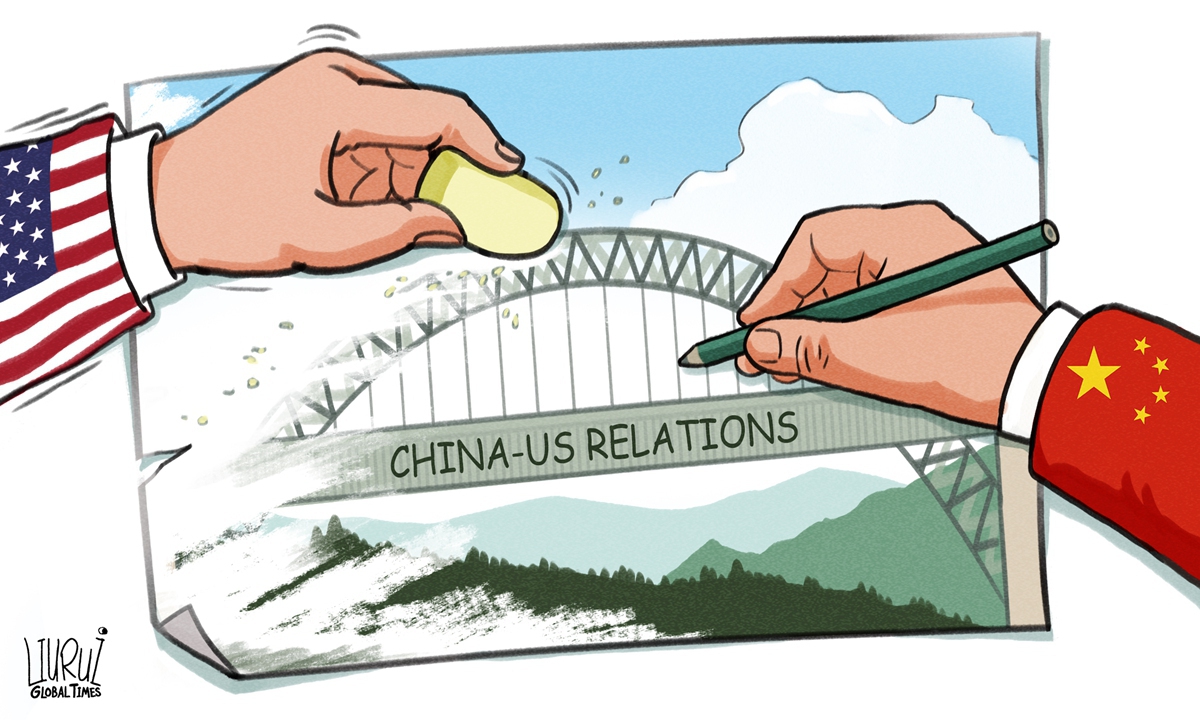
China-US relationship. Illustration: Liu Rui/GT
In the latest response to the absence of a meeting between Chinese and US defense ministers on the sidelines of the 11th ASEAN Defence Ministers' Meeting Plus (ADMM-Plus),
mk Wu Qian, a spokesperson for China's Ministry of National Defense, said the responsibility lies entirely with the US side. Wu said the US cannot undermine China's core interests by selling arms to Taiwan island on the one hand while pretending that nothing happened and seeking to engage in military exchanges with China on the other. He urged the US to immediately correct its mistakes, earnestly respect China's core interests, and create favorable conditions for high-level military exchanges between the two sides. Previously, US Secretary of Defense Lloyd Austin complained about the Chinese side's refusal to meet with its defense official, expressing "regret" and saying that "it was unfortunate" and "is a setback for the whole region."
The US perhaps knows better than anyone else why the Chinese side "refused to meet with its official." Just last month, the US Department of Defense approved $2 billion in arms sales to the island of Taiwan. This, the largest arms sale to the island under the Joe Biden administration, includes weapons, such as advanced surface-to-air missile defense systems and radar systems. Many US media outlets have noted that the missile defense system "has been battle-tested in Ukraine" - what that means is self-explanatory. China has repeatedly made it clear to the US that the Taiwan question is the first red line that must not be crossed in China-US relations. Despite this, the Pentagon insisted on standing on the periphery of China's red line and continuing to provoke China, instead of creating the conditions for dialogue. Some people in the US even act innocent: They talk about "dialogue," but what they do is create a "communication" in the sense of "I can hit you but you can't hit me back." China will never tolerate such behavior.
Since the beginning of this year, the defense ministers of China and the US have had face-to-face communication, while the China-US Defense Policy Coordination Talks, the working group meeting of the Military Maritime Consultative Agreement and the theatre-level commander talks have resumed one after another. If the US side really is trying to blame "China's lack of willingness to communicate," how can these interactions be explained?
On the one hand, the US continues to undermine China's interests, creating trouble regarding the Taiwan question and the South China Sea issue. On the other hand, it emphasizes the so-called "crisis management" by presenting itself as "responsible" - It claims it seeks dialogue with the Chinese side, but still publicly shifts the blame to China and gives it the label of being "unwilling to communicate." This type of performance was quite a failure, and the fact that almost no regional country has responded to such an "awkward performance" from Austin actually says it all. This is not the first time that this kind of manipulation has occurred, and its purpose has long been clear to the international community.
During this meeting, China's proposals, such as "building a closer security community," were widely welcomed by participating countries, with many seeking dialogues with China. In recent days, China has held discussions with defense officials from Malaysia, Thailand, India, Japan, and others. Notably, after the much-anticipated China-India defense ministers' meeting, India's Defense Minister Rajnath Singh described the talks as "extremely productive" on social media, stating that both sides "agreed to work together towards a roadmap for rebuilding mutual trust and understanding." During the 14th China-ASEAN Defense Ministers' Informal Meeting, ASEAN countries also expressed their desire to further enhance pragmatic security cooperation with China. A Global Times editorial last year remarked that China's diplomacy is very busy and has no time to receive insincere people. The current situation is no different.
The critical importance of military dialogue in China-US relations is undeniable and is often referred to as the last "safety valve" between the two nations. The purpose of such dialogue is to promote cooperation, build trust and resolve misunderstandings. China has consistently advocated addressing issues through dialogue on the basis of mutual respect and has followed through with this approach. Why, then, can so many countries successfully engage in talks with China's defense minister, while the US cannot? Shouldn't this prompt some serious reflection on the part of the US? We hope the US can tone down its "awkward performances" and focus more energy and effort on genuinely advancing regional peace and stability.
What truly constitutes the region's well-being, and what represents its setbacks? At the 11th ADMM-Plus, the Chinese side called for the firm consolidation of ASEAN centrality and support for the improvement and upgrading of the existing cooperation framework, opposing "starting all over again" or creating "small circles"; we should firmly maintain the unity of regional countries and oppose the introduction of bloc politics and camp confrontation into the region; we are firmly committed to resolving issues through dialogues, and oppose provoking disputes, resorting to force, ganging up or even soliciting external forces.
This reflects the common aspirations of countries in the region. Regional nations can clearly see who is sincerely contributing to peace and who is promoting division and confrontation in the name of peace.

